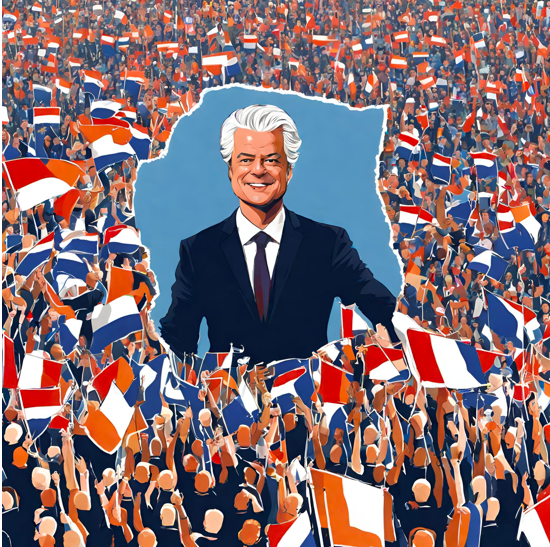Written by Mateo Suarez-Mash (International Relations MSc) and Theano Ntokou (Public Affairs MSc) both authors have been awarded CBE Studentships
An unexpected fall of the Dutch government in July 2023 resulted in an interesting electoral battle that appears to trouble the national political scene. More specifically, citizens of the Netherlands cast their votes on 22 November in early general elections that were held after the collapse of the government. Mark Rutte, the former Dutch Prime Minister who was one of the longest – serving leaders in Europe, made the decision to resign earlier this summer after a challenging crisis over asylum policy. The disagreement arose after Rutte suggested to introduce more rigid restrictions on the reunification of families of asylum seekers, with the aim of decreasing the number of migrants living in the country. The dispute resulted in the breakdown of the governing coalition.
The result of the election created great controversy in the Netherlands and on the European level. The Party for Freedom (PVV), which is a populist radical right party led by Geert Wilders, won 37 seats in the country’s 150 – seat House of Representatives, becoming the largest party for the first time in the country’s history. On the other hand, Rutte’s People’s Party for Freedom and Democracy (VVD) won only 24 seats and the left wing Green coalition only 25 seats.
As mentioned, the man behind this controversial electoral battle is Geert Wilders, the leader of the PVV. Whilst this recent victory is surprising to most, his political movement has long been brewing in the background. The 60-year-old politician is the longest serving MP in his country and entered Parliament as a member of the centre-right Liberals (VVD) in 1998. Wilders felt that the VVD was too soft towards Islam, thereby quitting the party in 2004 to eventually create the PVV.
Wilders’ PVV party targeted a large bloc of anti-immigrant, Eurosceptic voters who had been waiting for a leader such as himself to emerge on the political scene after the assassination of Pim Fortuyn back in 2002. Fortuyn, who was an openly gay sociology professor and publicist that created great controversy in Dutch politics because of his populist and racist views: he provided an inspiration for Wilders and the political party he created. Wilders took over Fortuyn’s constituency after his death by inheriting his anti – Islamic and anti – immigration views to gain political mileage. Wilders was side-lined during most of his parliamentary career by other parties refusing to work with him. However, this changed in 2010, as the PVV won 24 seats in Parliament and worked with the governing party of the time. Nonetheless, when the 2010-11 Euro crisis erupted, the populist leader withdrew his support for the government as his party opposed providing financial aid to Greece. Despite being shunned by other major parties, the PVV maintained a significant election presence throughout the years, by gaining 13% of the vote in 2017 and 11% in 2021. Given the latest election results, it will be difficult to bypass the PVV and Wilders in the formation of the next government. Coalition formation agreements with the PVV can now be pivotal in Wilders’ career, making him the next potential Dutch Prime Minister.
What’s Next?
A probable outcome, as suggested by Professor Sarah de Lange (University of Amsterdam), is a right-wing governmentcomprising the PVV, Rutte’s VVD Party, and Omtzigt’s New Social Contract party. However, this might require Wilders to compromise on the most extreme components of his manifesto, including zero immigration, banning the Quran, and closing mosques. On fiscal policy, Wilders’ party advocates increasing public spending, but this is not backed by credible financing plans. On the other hand, coalition partners interested in fiscal control may seek to achieve balance between spending and cuts. Strict views on immigration, the housing crisis in the Netherlands, as well as EU and foreign policy, were most likely the significant issues that secured the victory of PVV in the recent election. A Wilders-led government is expected to adopt a more confrontational stance with the EU, although this might be tempered by coalition partners. At the same time, the EU is closely monitoring the Netherlands’ government formation. To court allies, Wilders may need to rule out a “Nexit” vote, which has been one of the main points in his electoral campaign so far. If Wilders becomes Prime Minister, the potential collaboration between him and other Eurosceptic leaders within the EU, could result in the disruption of policymaking on issues requiring unanimity, such as sanctions against Russia and support for Ukraine. The EU is also considering potential implications for the upcoming European Parliament elections, recognising that a repeat of the PVV’s success could complicate the approval of legislation , especially related to climate change.

